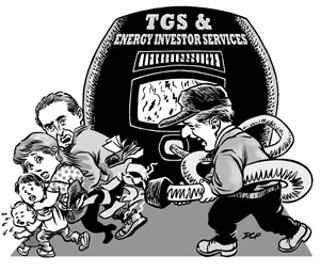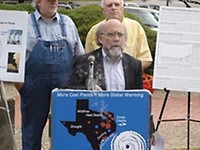Is Texas Gas Burning Austinites' Money?
Energy gadfly says utility may be overcharging customers
By Daniel Mottola, Fri., April 15, 2005

Based on a citizen's complaints, the city is investigating whether Texas Gas Service has effectively overcharged Austin customers by more than $10 million over the past year. Local environmental and energy policy gadfly Paul Robbins (editor of The Austin Environmental Directory) believes that poor, even amateurish business practices at TGS are to blame for the utility's steep natural gas prices in recent months. After some scrupulous research and a flurry of complaint letters, Robbins eventually got the attention of the city's Telecommunications and Regulatory Affairs manager, Rondella Hawkins, who has launched an investigation into the claims. "We've met with TGS and we're looking at their purchasing practices and contracts," Hawkins said. "We are waiting on additional information from the gas company [that will] help us determine if they're not being prudent in their practices."
TGS dismisses Robbins' accusations as unfair and unfounded.
The money hunt started when Robbins got his first big gas bill for the winter and noticed that TGS's fuel cost seemed unusually high. At TGS, as at most utilities, fuel cost is a pass-through charge to customers, one that's not subject to markup. As he analyzed the fuel costs TGS reported over the past 13 months, Robbins began to wonder why the gas company's costs were as much as 18% higher than what Austin Energy reported paying for gas, for use in AE's power plants. According to his calculations, the difference equals between $35 and $44 more per average customer, per year. When he calculated the gross amount over the 13-month period for 165,576 customers – including also about one-third commercial customers – his total came to a staggering $10.6 million.
In a letter to the city, Robbins discussed the inevitable consequences for local consumers of the apparent higher costs at TGS: "Gas prices in the last few years have been extraordinarily high, and a lot of poor people will go cold this winter because of it, while middle-income people will have less disposable income." As a potential solution, Robbins believes AE's use of "hedging" in its gas purchasing – that is, locking in large purchases when gas prices are lower – is the key to their lower overall costs, and he recommends the same method for TGS.
The company reviewed Robbins' claims, says TGS communications director Larry Graham, and it is their position that "he didn't do an apples-to-apples comparison." Graham says "fundamental differences" from AE, including the fact that they buy 2.5 times more gas than TGS, make it impossible to compare the two utilities directly. "There's a whole lot about how they buy gas that we don't know, and I'm not sure he knows," Graham said. In a letter responding to Robbins' initial complaints, Graham cited factors like TGS's pipeline, transportation, and storage expenses as well as the two utilities' very different "load profiles," reflecting the times of year when they use the most gas. As for Robbins' hedging recommendation, Graham wrote, "at this time, TGS does not have the authority [from the city of Austin] to use financial instruments such as hedging," and added that TGS is "not sure whether [AE's hedging] program was in place during the period you analyzed." Graham recommended a different analysis, writing, "While we understand why you would compare TGS to AE, we feel that comparing TGS to other gas utilities would be a better comparison. We believe that our gas purchasing strategies compare quite favorably to other utilities in Texas and certainly in the United States."
In a letter to the city, Robbins forcefully rejected Graham's explanations. "I disagree with most of the gas company's assertions," he wrote, "a few of which are outrightly specious." Robbins referred to a recent Texas Railroad Commission report that does just what Graham suggested – compares pricing among Texas natural gas utilities. "According to the costs in this report, the TGS-Austin system has the 7th highest average fuel cost of the 25 major cities in Texas for the 12 months of 2004." Robbins argued that his original calculations do in fact include TGS's pipeline, transportation, and storage expenses, and that while the two utilities' load profiles differ significantly based on season, there were noticeable savings by AE in every single month of the analysis. "Moreover, there were substantial savings by AE in both Nov. of 2003 and Nov. 2004, a month when the gas volume used by AE is much lower than in its summer peak season," he wrote.
Robbins dismissed Graham's defense that TGS doesn't have the authority from the city to use financial instruments such as hedging – because the company hasn't asked. "In my phone conversations with Mr. Hubbard [TGS gas accounting manager], he said that TGS had not pursued hedging authority in Austin, but has in its El Paso branch," Robbins wrote. "Austin Energy's hedging program was in full effect during the 13 months I analyzed." If TGS was unsure of whether AE was using hedging, Robbins noted bluntly, "It would be a simple thing to ask them. I did."
Robbins is not alone in his low opinion of TGS's defense of its policies. "It's not that they're evil people; they're incompetent people," said professor Ehud Ronn, director of UT's Center for Energy Finance, in response to our request to review the correspondence. Ronn said he was underwhelmed by many of TGS's responses, which he said smacked of sloppy staff work. "Wise, cautious, conservative hedging makes good business sense," he said, "but it is by no means a guarantee of low prices." In TGS's case, Ronn said, "they didn't even go through the motion of asking for hedging authority from the city of Austin. This is a failure to do their job properly, since they've done hedging in El Paso."
Hawkins said her office is pursuing the investigation with its limited resources, but that it's certainly a priority. "We're trying to wrap it up as soon as practicable." According to Graham, TGS is working to get more information and do more meaningful comparisons on gas costs. "We have people doing additional research, starting where Paul started." He said TGS is open to finding better ways to manage gas costs.
Robbins hopes his efforts will be useful not only in lowering Austinites' gas bills, but also in the city's review of its gas franchise agreement with TGS, which expires in November of 2006.
Got something to say on the subject? Send a letter to the editor.










